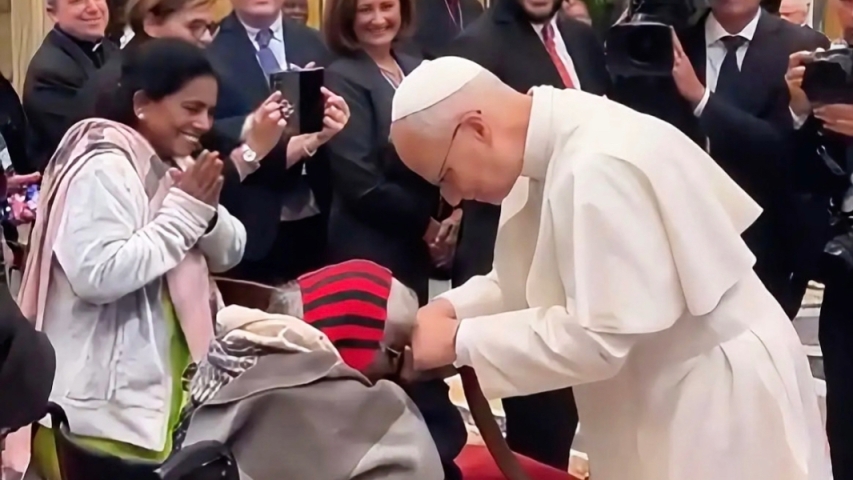
Photo courtesy of the Diocese of Srikakulam, India
VATICAN CITY - Bishop Rayarala Vijaykumar made a decision that probably seemed odd to some Vatican officials: he brought his mother to work. She’s in a wheelchair. The trip from Srikakulam, a diocese on India’s eastern coast where the Bay of Bengal hammers the shore, isn’t easy. But he was speaking at an international conference on elder care, and leaving her behind felt wrong.
On October 3, Pope Leo XIV walked into the audience hall. Protocol would suggest a handshake, maybe a blessing from a respectful distance. The Pope ignored protocol. He bent down until his face was level with hers, this woman who’d raised a son in a place that still remembers how to respect the old.
She reached up and touched his cheeks. Not asking for anything. Just touching him. Then she brought her fingers to her forehead, a gesture Indian grandmothers have made for centuries. The whole thing took maybe 30 seconds.
“It was deeply symbolic,” the bishop said later, his voice catching.
Here’s what makes that moment matter: Leo XIV is five months into a papacy built on an unpopular idea. He thinks families are the answer to problems most people assume require government programs or nonprofits or therapy apps. He’s the first American pope, elected in May at age 70, and he picked a name that deliberately echoes Leo XIII, the pope who responded to the Industrial Revolution by writing about workers’ rights and human dignity. This Leo is betting his papacy on the notion that our crisis isn’t primarily economic or political. It’s relational. And it’s killing us.
The numbers back him up, sort of. Loneliness increases your chance of dying early by 26%, about the same as smoking 15 cigarettes a day, according to research published in Nature Human Behavior. Depression among seniors has spiked even in wealthy countries with excellent healthcare. We’ve gotten very good at keeping old bodies alive while letting old souls starve.
The conference brought 150 delegates from 65 countries to Rome to discuss what happens to people when they stop being economically useful. It’s not a Catholic problem. Japan has more adult diapers than baby diapers on store shelves. In South Korea, elderly poverty rates hit 40%. Even in India, where Bishop Vijaykumar comes from, the joint family system is collapsing. Young people chase jobs in Mumbai and Bangalore. Old people stay in villages with empty rooms and fading photos.
Vijaykumar addressed the delegates in Italian, representatives from 55 bishops’ conferences, plus dozens of organizations that run nursing homes and elder care facilities. But he was really speaking a much older language.
“Maatru Devo Bhava, Pitru Devo Bhava,” he said. Sanskrit. It means: honor your mother like you’d honor God. Honor your father the same way. Not as a burden. Not as a problem requiring a solution. As sacred.
“The elderly connected generations,” he told them. “Now many of them sit alone.”
Then he said something that landed hard: “You can’t grow old right if you never lived with someone old.”
He meant it. We’ve severed the connection between young and old, and now nobody knows how to age because nobody’s actually watched it done up close. Three-year-olds don’t see their grandparents navigate loss. Teenagers don’t watch someone face mortality with grace or fear or faith. We’ve made aging invisible, and then we act surprised when people hit 65 and panic.
This is Leo XIV’s whole project. Since his election, he keeps circling back to family, not as a political weapon in culture wars, but as the structure that keeps humans from atomizing into lonely, anxious individuals. He talks about tomorrow’s children and yesterday’s grandparents with equal intensity. Other popes have defended traditional family structures. Leo’s asking harder questions: what happens when families break? Who catches the people who fall through? What does the Church actually do besides wag its finger at divorce rates?
Cardinal Kevin Joseph Farrell runs the Vatican office that organized this conference. He’s the one who made sure Bishop Vijaykumar could bring his mother. That choice changed everything. Every policy discussion happened with her sitting there. Every abstract plan for “support systems” and “pastoral outreach” had to face the reality of one woman in a wheelchair who’d spent her life raising a son.
The conference ended with the usual deliverables: action plans, new partnerships, training programs for priests and lay workers. Useful stuff. But what people remember is the Pope who honors the forgotten.
Outside, Rome did what Rome does, tourists, traffic, scooters weaving through impossibly narrow streets. Inside the Vatican, for half a minute, something older and stranger happened. A son brought his mother to the most important meeting of his life. A Pope knelt to receive her blessing. And maybe, just maybe, the Church remembered what it’s supposed to look like when you actually believe people matter because they’re people, not because they produce anything.
Leo XIV’s critics think he’s nostalgic for a social order that’s gone and isn’t coming back. They’re probably right about the first part. Whether they’re right about the second part is the bet he’s making.
His supporters think he’s naming something everyone feels but nobody wants to say: we’ve built a civilization that doesn’t know what to do with people who can’t hustle. The old. The sick. The slow. Anyone who doesn’t fit into LinkedIn culture.
What nobody disputes is that the image works. An American Pope bending before an Indian mother, her bishop son standing beside her, three people from three generations making visible what the whole conference was supposed to be about.
Whether it changes anything is another question. The conference delegates flew home. Programs will launch. Some will work. Most won’t. But in a world where we warehouse the elderly and call it compassion, where loneliness is a public health crisis and nobody wants to admit that maybe we’ve organized our lives wrong, in that world, watching someone kneel before an old woman and let her touch his face looks less like sentimentality and more like subversion.
The wheels of her chair barely whispered against the marble as they left. Three people moving through a building designed to make everyone feel small. For once, it didn’t work.

